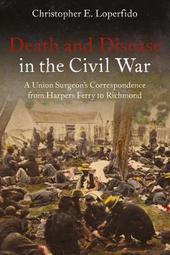
|
Death and Disease in the Civil War: A Union Surgeon's Correspondence from Harpers Ferry to Richmond
Paperback
Main Details
| Title |
Death and Disease in the Civil War: A Union Surgeon's Correspondence from Harpers Ferry to Richmond
|
| Authors and Contributors |
By (author) Christopher Loperfido
|
| Physical Properties |
| Format:Paperback | | Pages:168 | | Dimensions(mm): Height 229,Width 152 |
|
| Category/Genre | American civil war |
|---|
| ISBN/Barcode |
9781611213591
|
| Classifications | Dewey:973.7 |
|---|
| Audience | | Professional & Vocational | |
|---|
| Illustrations |
35 images
|
|
Publishing Details |
| Publisher |
Savas Beatie
|
| Imprint |
Savas Beatie
|
| Publication Date |
1 October 2017 |
| Publication Country |
United States
|
Description
Union surgeon James Dana Benton witnessed firsthand the suffering and death brought about by the ghastly wounds, infections, and diseases that wreaked havoc to both the Union and Confederate armies. A native of New York, Dr. Benton penned a series of letters throughout the war to his family relating his experiences with the 111th New York Infantry as an assistant surgeon, and later with the 98th New York as surgeon. His unique correspondence, together with insights from author Chris Loperfido, coalesce to produce Death and Disease in the Civil War: A Union Surgeon's Correspondence from Harpers Ferry to Richmond. Dr. Benton was present for some of the war's most gruesome and important battles, including Gettysburg, Cold Harbor, and the siege of Petersburg. He was also present at Harpers Ferry, Second Battle of Auburn, Battle of Morton's Ford, and Abraham Lincoln's second Inaugural address. His pen offers an insightful and honest look into what everyday life was like for the surgeons who tirelessly worked to save the men who risked their lives for the preservation of the nation. Loperfido's Death and Disease in the Civil War should be read by every student of the Civil War to better understand and come to grips with what awaited the wounded and the medical teams once the generals were finished with their work.
Author Biography
Christopher E. Loperfido is a native of Weedsport, New York and graduated from Oswego State University with a bachelor's degree in history and political science. Chris has worked for the National Park Service at the Gettysburg National Military Park in the summers of 2007 and 2008 as a park intern and National Park Service Ranger. He is currently employed by the Department of Homeland Security and lives with his wife, son, and pug in Washington State.
Reviews"More than 600,000 men perished in the Civil War, and many more were wounded or fell ill. Prompt and timely attention from an army surgeon was often the difference between life and death. James Benton's letters home provide a compelling glimpse into the everyday life of these doctors--their concerns and frustrations, their patients and colleagues, the places visited, and their opinions on the war. I commend Christopher Loperfido for bringing this interesting slice of the war to light."--Scott L. Mingus, Sr., award-winning author of Confederate General William "Extra Billy Smith" From Virginia's Statehouse to Gettysburg Scapegoat "Christopher Loperfido's excellent arrangement of Surgeon James D. Benton's letters provide a compelling look at the life of a Union doctor during a time when the practice of medicine was still primitive and an understanding of health in general was scanty at best. Death, Disease, and Life at War is another valuable piece to the puzzle of understanding what it was like to serve in the Civil War."--Meg Groeling, author of The Aftermath of Battle: The Burial of the Civil War Dead "Civil War history is replete with accounts of tactics and acts of battlefield heroism, but daily life for army surgeons remains something of a mystery. Christopher Loperfido offers us an invaluable glimpse of that life by editing and publishing Dr. Benton's letters in Death, Disease, and Life at War. The assistant surgeon with the 111th New York Infantry writes about everything from wounds, lice, exhaustion, and dysentery, to generalship, money, loneliness, and the perennial desire for more frequent letters from home. Extensive annotations provide context for the events described in the letters, and help readers get a sense of what it was like for one man to spend four years of his life away from his family and at war."--Dennis A. Rasbach, author of Joshua Lawrence Chamberlain and the Petersburg Campaign: His Supposed Charge from Fort Hell, his Near-Mortal Wound, and a Civil War Myth Reconsidered
|